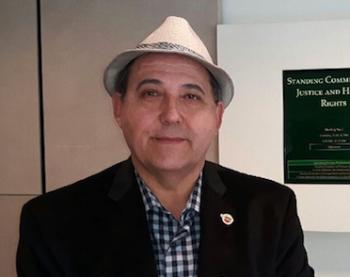Image Caption
Summary
By Andrea Smith
Windspeaker.com Contributor
EDMONTON
Kim Beaudin, National Vice-Chief of the Congress of Aboriginal Peoples, has been pushing hard to help displaced members of the Michel First Nation in Alberta.
He recently began rallying groups who have been fighting for years to have their status recognized, reinstated, or have it honored with real Treaty rights applicable to other status Indians in Canada.
Beaudin has now developed new strategies to push his agenda forward, which includes defining exactly what constitutes a member of the band, and holding an all-inclusive meeting Sept. 9 where he will consult all possible sources, including Skyping in Chief Brendan Mitchell of the Qalipu First Nation, another displaced First Nations band.
“This is actually the second meeting from the first one we had April 23. This one that’s coming up is an extension of that one… The big thing we’re looking at is the citizenship of the people… I don’t want to use the term membership, because you can be a member of a dog kennel,” said Beaudin.
To date, there has been dispute between the more than 750 citizens whose status were reinstated in the 80’s with Bill C-31, and the many other people who claim they are descendants, and who, so far, have not had a chance to officially apply and prove their connections to the people of Michel.
Beaudin seeks to include all of these people in the discussions he is having, because he knows too well the divisiveness of government tactics when it comes to stating who is status and who is not, he said.
Beaudin is having his legal counsel draft a statement of the intentions of the band members, which defines what constitutes a member. It will even take last names into consideration, he said.
He believes this will help him and the other Michel descendants (whoever they may be at the time this goes forward) have a stronger case before the government, a government who in the past has shot down efforts in this area.
“I’m not sure what the list is today, in terms of INAC, because there’s been Bill C-3 that entered that equation, so there would have been more people added. And of course, a lot have passed away. I believe there’s actually more,” said Beaudin.
There are also people who have also lost status over the years due to something he called a “generational cut-off.”
This cut-off declared status to only a few generations beyond the first Michel Band members were allowed to maintain status (they are a landless band, so it has been easier for the government to erase members’ status, Beauden asserts).
It’s Beaudin’s belief that Chief Mitchell can give advice regarding ways to move forward, and tactics to use, as well as tactics to avoid, because the Qalipu First Nation has also struggled for years with their own membership issues. And they’ve recently been undergoing intense government scrutiny, regarding their membership—something which has led to as many problems as it has good, according to Mitchell.
“At the meeting coming up, they want me to talk about the Qalipu situation. We formed a First Nation band in September of 2011. That was the official date. And what happened since that time is that so many people wanted to become part of the band, the band was introduced as an Order and Council, before the membership was finalized,” said Chief Mitchell, explaining this process basically means the government is asking for very real, tangible evidence of membership, including phone bills which show people who claim membership phone home to the community regularly.
“An agreement in principle in 2013, set out a bunch of criteria that was stricter than the way people got into the band in the beginning,” he said.
According to Chief Mitchell, members of the band initially were allowed to self-identify and those claims were trusted. However, the number of applicants grew exponentially as the cut-off date neared, so the government became suspicious.
Even Mitchell is suspicious of some of the memberships claims—some of which come from as far away as China and Europe—but he says there have also been legitimate claims which were thrown out due to the strict criteria.
“We have brothers and sisters who grew up in the same household, and one has a status card and one doesn’t. We have twins that grew up in the same house, and one has status and the other one doesn’t,” said Mitchell.
“The people who were hurt most by the whole process were the people who don’t live in Aboriginal communities. Most of them are mainlanders. They never had the documents saved up they needed,” he said.
Mitchell agrees with Beaudin for the need to have a membership criteria laid out before approaching the government with any membership claims and Treaty demands, so they don’t caught in the same mess the Qalipu First Nation is currently dealing with.
“It’ll come to bear on the Michel people… That’s the truth of it. How do they get that done, and what criteria will be required to be put in place? I can’t tell you. But I can tell you it won’t just be ‘put your name on a list’,” said Mitchell.

